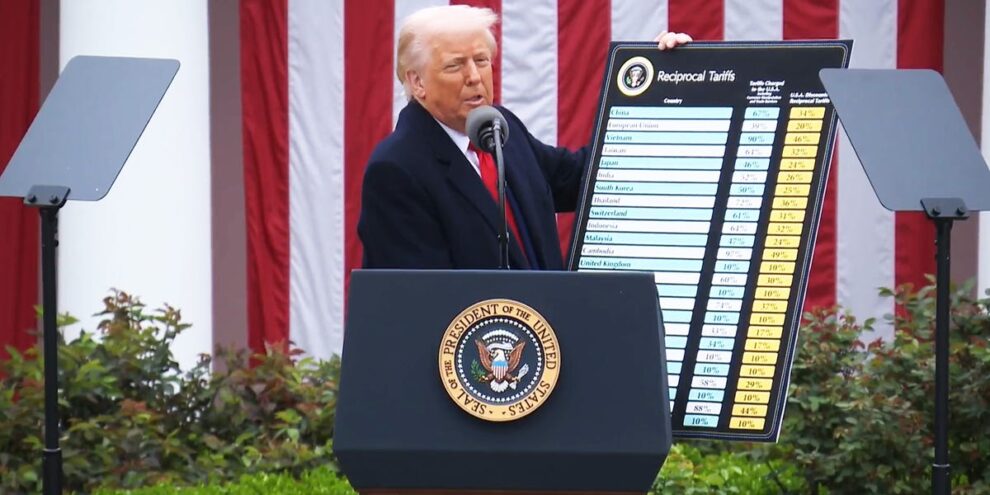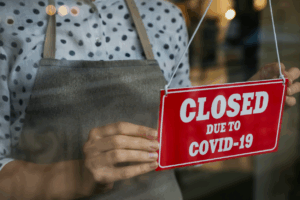The President imposed a “baseline” 10% tariff on all U.S. imports while many countries will face much larger rates.
Speaking from the Rose Garden on Wednesday afternoon, President Donald Trump announced tariffs on all goods imported into the United States. Saying the tariffs are in response to “foreign trade and economic practices” that have weakened America’s international economic position, the White House announced it is invoking his authority under the International Emergency Economic Powers Act of 1977.
Trump: In 1913, for reasons unknown, they established income tax so citizens rather than foreign countries would start paying the money necessary to run our government. Then in 1929, it all came to an abrupt end the great depression, it would have never happened if they had to… pic.twitter.com/YVwvvdnmaS
— Acyn (@Acyn) April 2, 2025
All countries conducting trade with the United States will be subject to the tariffs. A handful of nations, including the United Kingdom, Australia, and Saudi Arabia will only be subject to the “base rate” of 10%. However, other nations will have far higher rates imposed on their imports. These include China, which when combined with previously imposed tariffs, will have a 54% rate and the European Union which will be subject to a 20% tariff. Canada and Mexico are not subject to the latest tariff announcement, as they are under “a framework set out in Trump’s previous executive orders.”
In order to impose the sweeping tariffs, Trump declared a national emergency, saying “For decades, our country has been looted, pillaged, raped and plundered by nations near and far, both friend and foe alike.” Trump discussed the negative impacts these foreign trade practices have had on American blue-collar workers and farmers, while also laying the blame for this situation with “former presidents and past leaders who weren’t doing their job.”
While other nations’ leaders criticized the tariffs, Trump’s Treasury Secretary Scott Bessent told Fox News he recommended nations subject to the tariffs should not retaliate. “Sit back, take it in, let’s see how it goes,” Bessent told Bret Baier.
Canada’s Prime Minister Mark Carney said he would fight the latest tariff announcement, despite Canada not being impacted by the newly announced plans. Carney’s reasoning was that American tariffs would ultimately hurt Canada due to their close integration with the American economy.
While the expectation that Trump’s tariffs would be a 1-for-1 reciprocal plan, the President said they would not be fully reciprocal, but “approximately half” of the impediments other nations impose on American goods. Trump also said the best way for other nations to avoid tariffs completely is to “build your product right here in America.”
Former Trump critic and self-proclaimed “MAGA lefty” Batya Ungar-Sargon praised Trump’s tariff plans on Piers Morgan’s television program. Ungar-Sargon argued the President is siding with American workers rather than with Wall Street and the tariffs are part of an effort to stop the “de-industrialization of America.”
Here's the truth about tariffs: For 60 years they destroyed the American working class to funnel money upwards into the pockets of the rich. Donald Trump is the first president in generations to tell Wall Street to screw itself—he's for the working men and women of this country. pic.twitter.com/sCZRFeITYh
— Batya Ungar-Sargon (@bungarsargon) April 3, 2025
After the announcement, Vice President JD Vance praised Trump’s tariffs, saying the world has seen America as their “piggy bank” for the past four decades and President Trump is standing up to “ridiculous trade practices and economic practices of friend and foe alike. Vance’s defense of an international economic policy that will prioritize American workers was a stark contrast to criticism from “supporters of globalization” and to his predecessor Mike Pence who criticized the tariffs after the announcement. The tariffs are being framed as part of a “broad trade reset” in which the President intends to use America’s economic superiority as “a diplomatic and geopolitical tool.”





